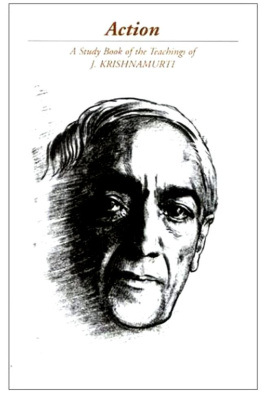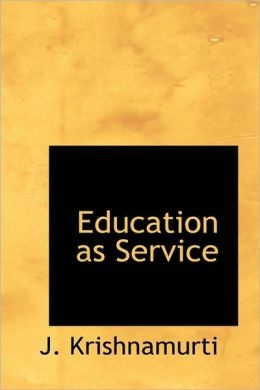Krishnamurti - Krishnamurti on Education
Here you can read online Krishnamurti - Krishnamurti on Education full text of the book (entire story) in english for free. Download pdf and epub, get meaning, cover and reviews about this ebook. publisher: Krishnamurti Foundation India, genre: Religion. Description of the work, (preface) as well as reviews are available. Best literature library LitArk.com created for fans of good reading and offers a wide selection of genres:
Romance novel
Science fiction
Adventure
Detective
Science
History
Home and family
Prose
Art
Politics
Computer
Non-fiction
Religion
Business
Children
Humor
Choose a favorite category and find really read worthwhile books. Enjoy immersion in the world of imagination, feel the emotions of the characters or learn something new for yourself, make an fascinating discovery.

- Book:Krishnamurti on Education
- Author:
- Publisher:Krishnamurti Foundation India
- Genre:
- Rating:4 / 5
- Favourites:Add to favourites
- Your mark:
- 80
- 1
- 2
- 3
- 4
- 5
Krishnamurti on Education: summary, description and annotation
We offer to read an annotation, description, summary or preface (depends on what the author of the book "Krishnamurti on Education" wrote himself). If you haven't found the necessary information about the book — write in the comments, we will try to find it.
Krishnamurti on Education — read online for free the complete book (whole text) full work
Below is the text of the book, divided by pages. System saving the place of the last page read, allows you to conveniently read the book "Krishnamurti on Education" online for free, without having to search again every time where you left off. Put a bookmark, and you can go to the page where you finished reading at any time.
Font size:
Interval:
Bookmark:
Krishnamurti on Education
Copyright 1974 Krishnamurti Foundation of America
& Krishnamurti Foundation Trust Ltd
Krishnamurti
on
Education
Contents
Foreword
This book is the outcome of talks and discussions held in India by J. Krishnamurti with the students and teachers of schools at Rishi Valley School in Andhra Pradesh and Rajghat at Varanasi. These centres are run by the Krishnamurti Foundation India, which was set up to create a milieu where the teachings of Krishnamurti could be communicated to the child. Krishnamurti regards education as of prime significance in the communication of that which is central to the transformation of the human mind and the creation of a new culture. Such a fundamental transformation takes place when the child, while being trained in various skills and disciplines, is also given the capacity to be awake to the processes of his own thinking, feeling and action. This alertness makes him self-critical and observant and thus establishes an integrity of perception, discrimination and action, crucial to the maturing within him of a right relationship to man, to nature and to the tools man creates.
There is a questioning today of the basic postulates of the educational structure and its various systems in India and in the rest of the world. At all levels there is a growing realization that the existing models have failed and that there is a total lack of relevance between the human being and the complex, contemporary society. The ecological crisis and increasing poverty, hunger and violence, are forcing man inevitably to face the realities of the human situation. At a time like this, a completely new approach to the postulates of education is necessary. Krishnamurti questions the roots of our culture. His challenge is addressed not only to the structure of education but to the nature and quality of mans mind and life. Unlike all other attempts to salvage or suggest alternatives to the educational system, Krishnamurtis approach breaks through frontiers of particular cultures and establishes an entirely new set of values, which in turn can create a new civilization and a new society.
To Krishnamurti, a new mind is only possible when the religious spirit and the scientific attitude form part of the same movement of consciousnessa state where the scientific attitude and the religious spirit are not two parallel processes or capacities of the mind. They do not exist in watertight compartments as two separate movements that have to be fused but are a new movement inherent in intelligence and in the creative mind.
Krishnamurti talks of two instruments available to the human beingthe instrument of knowledge which enables him to gain mastery over technical skills, and intelligence which is born of observation and self-knowing.
While Krishnamurti gives emphasis to the cultivation of the intellect, the necessity to have a sharp, clear, analytical and precise mind, he lays far greater stress on a heightened critical awareness of the inner and outer world, a refusal to accept authority at any level, and a harmonious balance of intellect and sensitivity. To discover the areas where knowledge and technical skills are necessary and where they are irrelevant and even harmful, is to Krishnamurti one of the fundamental tasks of education, because it is only when the mind learns the significance of the existence of areas where knowledge is irrelevant that a totally new dimension is realized, new energies generated, and the unused potentialities of the human mind activated.
One of the unsolved problems and challenges to educationists all over the world is the problem of freedom and order. How is a child, a student, to grow in freedom and at the same time develop a deep sense of inner order? Order is the very root of freedom. Freedom, to Krishnamurti, has no terminal point but is renewed from moment to moment in the very act of living. In these pages, one can get a glimpse, a feel, of this quality of freedom of which order is an inherent part.
The years which a student spends in a school must leave behind in him a fragrance and delight. This can only happen when there is no competition, no authority, when teaching and learning is a simultaneous process in the present, where the educator and the educated are both participating in the act of learning.
Unlike the communication of the religious spirit by various sects and religious groups, Krishnamurtis approach is in a sense truly secular and yet has a deeply religious dimension. There is a departure in Krishnamurtis teachings from the traditional approach of the relationship between the teacher and the taught, the guru and the shishya. The traditional approach is basically hierarchical; there is the teacher who knows and the student who does not know and has to be taught. To Krishnamurti, the teacher and the student function at the same levelcommunicating through questioning and counter-questioning till the depths of the problem are exposed and understanding is revealed, illuminating the mind of both.
The Krishnamurti Foundation India feels deeply privileged to be able to offer this book to the student and the educator.
The Editors.
Talks to
Students
1 / On Education
You know, you live in one of the most beautiful valleys I have seen. It has a special atmosphere. Have you noticed, especially in the evenings and early mornings, a quality of silence which permeates, which penetrates the valley? There are around here, I believe, the most ancient hills in the world and man has not spoilt them yet; and wherever you go, in cities or in other places, man is destroying nature, cutting down trees to build more houses, polluting the air with cars and industry. Man is destroying animals; there are very few tigers left. Man is destroying everything because more and more people are born and they must have more space. Gradually, man is spreading destruction all over the world. And when one comes to a valley like thiswhere there are very few people, where nature is still not spoilt, where there is still silence, quietness, beautyone is really astonished. Every time one comes here one feels the strangeness of this land, but probably you have become used to it. You do not look at the hills any more, you do not listen to the birds any more and to the wind among the leaves. So you have gradually become indifferent.
Education is not only learning from books, memorizing some facts, but also learning how to look, how to listen to what the books are saying, whether they are saying something true or false. All that is part of education. Education is not just to pass examinations, take a degree and a job, get married and settle down, but also to be able to listen to the birds, to see the sky, to see the extraordinary beauty of a tree, and the shape of the hills, and to feel with them, to be really, directly in touch with them. As you grow older, that sense of listening, seeing, unfortunately disappears because you have worries, you want more money, a better car, more children or less children. You become jealous, ambitious, greedy, envious; so you lose the sense of the beauty of the earth. You know what is happening in the world. You must be studying current events. There are wars, revolts, nation divided against nation. In this country too there is division, separation, more and more people being born, poverty, squalor and complete callousness. Man does not care what happens to another so long as he is perfectly safe. And you are being educated to fit into all this. Do you know the world is mad, that all this is madnessthis fighting, quarrelling, bullying, tearing at each other? And you will grow up to fit into this. Is this right, is this what education is meant for, that you should willingly or unwillingly fit into this mad structure called society? And do you know what is happening to religions throughout the world? Here also man is disintegrating, nobody believes in anything any more. Man has no faith and religions are merely the result of a vast propaganda.
Next pageFont size:
Interval:
Bookmark:
Similar books «Krishnamurti on Education»
Look at similar books to Krishnamurti on Education. We have selected literature similar in name and meaning in the hope of providing readers with more options to find new, interesting, not yet read works.
Discussion, reviews of the book Krishnamurti on Education and just readers' own opinions. Leave your comments, write what you think about the work, its meaning or the main characters. Specify what exactly you liked and what you didn't like, and why you think so.








